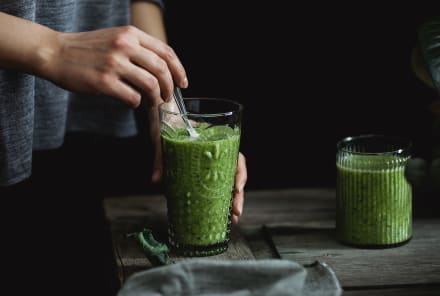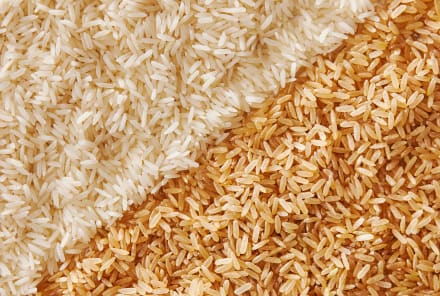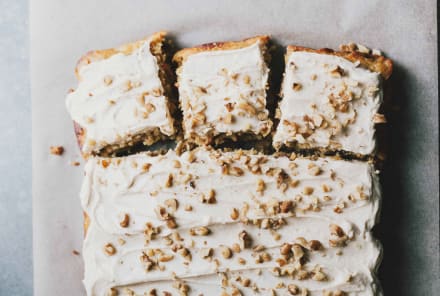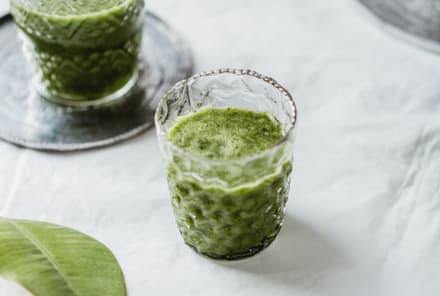Advertisement
How To Make The Best Turmeric Tea To Fight Inflammation All Day Long

Healing herbs and spices are a great way to support overall health and wellness. Knowing all the awesome stuff they do for us is one thing, but actually applying that knowledge to everyday life? Two different things. As a dietitian and health coach, I help my clients make it easy to work these superfoods into their everyday life and reap those benefits in delicious ways.
Turmeric is one of my absolute favorite healing foods because it has a rich history as a medicinal food and is incredibly versatile in the kitchen. Here, I'm going to talk about turmeric tea, an ancient remedy that absolutely has a place in a modern-day self-care routine.
What is turmeric, and what is it good for?
Turmeric is an herb that's related to ginger and grown throughout India, other parts of Asia, and Central America. This golden-hued rhizome has been used for thousands of years to treat a wide variety of ailments. A lot of those health benefits have been linked to the powerful anti-inflammatory and antioxidant properties of turmeric. Curcumin, the active compound in turmeric, has been extensively studied1 for its preventive health benefits and disease-fighting potential.
Some of the conditions turmeric has been most commonly used for include:
- Pain and inflammation
- Joint conditions like arthritis1
- Digestive discomfort and inflammatory conditions1 like colitis
- Hay fever
- Depression2
- Itchiness
- Glowing skin
- Acne
- Immune system support
- Heart health3 (for example, improving endothelial function3 and reducing free-radical damage4)
Inflammation is a root cause of many health conditions like heart disease5, metabolic syndrome, and even cancer6 as well as cognitive decline7, so anti-inflammatory foods like turmeric can help protect us against these ailments. Studies have also looked at8 the anti-aging potential of turmeric and curcumin.
While it's available in whole root form as well, turmeric is most commonly sold in powdered form. Capsules containing turmeric extract are also available. There's some slight variation, but in general, turmeric powder is about 3 percent curcumin, and extracts are about 95 percent curcumin. While most clinical research studies look at turmeric extracts, consuming ½ teaspoon to 1 teaspoon (about 2.5 to 5 grams) of turmeric powder with food per day has been associated with health benefits, but even smaller amounts between 500 and 2,000 milligrams of turmeric per day (that's about 15 to 60 mg of curcumin9) may also provide some benefit.
That said, it's important to use caution if you are pregnant, have a health condition, or are taking medications, especially blood-thinning or diabetes medications—more on that later.
While curcumin on its own is not absorbed incredibly efficiently into the bloodstream, consuming it with black pepper enhances absorption10, thanks to a substance present in the pepper called piperine.
We tend to associate turmeric with spicy flavors because we're so used to enjoying it in the context of dishes like curries that pack some heat. On its own, turmeric is actually pretty mild, with a very slight and warm peppery taste.
What is turmeric tea?
While you can consume turmeric in food throughout the day (breakfast is a great option), tea is a great way to work healing herbs and spices into your wellness routine. You may not want to gnaw on the raw form or might not have the time to cook ground forms into foods in consistent amounts, but tea gives you the option of sipping them. Aside from the physical benefits, there is just something so incredibly soothing about sitting down to a warm beverage.
Turmeric tea is an ancient ayurvedic remedy to help boost skin health and digestive health. Traditionally, turmeric tea contains black pepper (to enhance the absorption) and ginger, another warming herb with powerful anti-inflammatory properties.
I was first introduced to turmeric tea back when I was a nutrition student volunteering in a comprehensive care clinic in a New York City hospital. The physician I worked under was also trained in ayurveda, and she integrated this approach into her sessions. Sure, she would prescribe medications, but she would also recommend herbs and spices to help manage different symptoms and health conditions patients were dealing with.
Turmeric tea was something the doctor frequently recommended to patients, and their positive experiences were enough to inspire me to try it in my own life. I still remember the first time I gave it a shot—a week before I was supposed to be a bridesmaid in a friend's wedding, I came down with a nasty spring cold. I was willing to try anything... Fast-forward almost a decade, and it's still a major player in my "feel better" arsenal—and something I recommend to clients.
The classic turmeric tea preparation makes a great addition to your wellness routine, but there are lots of delicious variations to try.
Some recipes call for the addition of lemon juice, which provides a boost from immune-supporting vitamin C11.
You may also wish to add an extra kick with green tea, which has been associated with improved mental alertness, protection against cancer, and weight management. Using matcha is another amazing way to up the antioxidant ante. Just keep in mind that green tea and matcha do have caffeine, so maybe skip this if you're trying to wind down before bed.
Because fat also enhances absorption of curcumin, enjoying these spices in golden milk can help you enjoy the benefits even more. Try it with steamed coconut milk or whole milk and add honey or your other favorite sweetener to taste for your desired level of sweetness.
While turmeric tea is traditionally enjoyed hot, you can also try it cold.
When to use turmeric tea.
You can use turmeric in a variety of foods and beverages. Turmeric tea is a convenient way to work this superfood into your wellness routine. You can enjoy it as a warming drink to soothe your soul on chilly day when you want to feel like you've got your summer glow back. It's also a great option for when you're dealing with certain health issues.
Turmeric tea is one of my go-to cold remedies and what I immediately reach for when I need to give my immune system a boost as I'm fighting something off. The second I feel a scratchy throat or that tell-tale "oh no, here it comes" ache in my limbs, I make myself a cup.
Turmeric tea is also great for athletes repairing an injury or looking to soothe inflammation related to their sport (I especially recommend consuming it with collagen if you're using it for this purpose). Even for people who aren't athletes but just enjoy physical activity as a regular part of their life, you may benefit from including it in your routine. In my own life, I've also found it helpful as a complement to physical therapy at times I was healing and trying to ease soreness and regain strength and mobility.
Many health care practitioners also recommend turmeric to support healing of joint conditions or other inflammatory issues in the body. For someone who wants to be consistent with their turmeric intake but doesn't want to take supplements, turmeric tea can be an easy way to make it happen.
Rather than throw it back quickly, I like to make a big mug and enjoy it in small sips through the day. The spices tend to settle to the bottom, so just give it a little stir if needed.
When to avoid turmeric tea.
It's always a good idea to check in with your doctor before incorporating herbs into your routine, especially if you're on any medications, are pregnant, or have a health condition in which you need to be aware of any interactions or contraindications.
Regularly taking amounts of turmeric commonly found in food is generally considered safe, but you should avoid it if you have gallstones12, bile duct problems, or an increased risk of kidney stones13.
Additionally, very high intake of turmeric may cause gastrointestinal discomfort. Also, if you have an iron deficiency or are prone to one, be mindful that turmeric may impair iron absorption14. Because curcumin can slow blood clotting, you should avoid taking high doses if you're on blood thinners15, and people on diabetes medications16 should consult with their doctor, as turmeric can lower blood sugar.
While enjoying turmeric in food when pregnant or breastfeeding is considered safe, there is not enough research to state whether taking turmeric supplements is safe during this time. If you're planning to enjoy turmeric tea only very occasionally, it's likely fine, but if you plan to make it a regular thing, touch base with your doctor to discuss safe use of turmeric.
My go-to turmeric tea recipe.
We already talked about the many delicious variations on turmeric tea, but it's good to start with a solid base recipe you can build on. This easy recipe is my go-to, but again, feel free to customize however you like. I hope you love this and find it helpful.
Serves 1
Ingredients
- 8 fluid ounces water
- 1 teaspoon ground turmeric
- ¼ teaspoon ground black pepper
- ¼ teaspoon ground ginger
Method
- Pour water into a small saucepan and stir in turmeric.
- Bring to a boil over medium heat. Let boil for 5 minutes, then remove from heat. Stir in black pepper and ginger, stirring well to incorporate all ingredients.
- Enjoy your tea in small sips, gently shaking or stirring if liquids and solids separate.
The bottom line?
Turmeric tea is an ancient ayurvedic remedy that makes a great addition to your modern-day self-care routine by making it easy to harness the powers of this healing herb. You can enjoy the classic recipe but have fun trying different variations.
If you're not sure you'll enjoy it, remind yourself that if you hate it, you never have to make it again! You can also start slow but using a smaller amount of turmeric. Mixing your turmeric tea with something more familiar like green tea or enjoying it in the form of golden milk may also help you warm up to the taste of turmeric if it's new to you.
Just be mindful that high doses of turmeric may not be appropriate if you have a medical condition, are pregnant or breastfeeding, or taking certain medications. If you need some guidance, touch base with your health care provider.
16 Sources
- https://www.ncbi.nlm.nih.gov/pmc/articles/PMC3535097/
- https://link.springer.com/article/10.1007/s00213-008-1300-y
- https://www.ncbi.nlm.nih.gov/pubmed/19233493
- https://www.ncbi.nlm.nih.gov/pubmed/23146777
- https://www.ncbi.nlm.nih.gov/pubmed/12490960
- https://www.ncbi.nlm.nih.gov/pubmed/12490959
- https://www.ncbi.nlm.nih.gov/pmc/articles/PMC3253025/
- https://www.ncbi.nlm.nih.gov/pubmed/20205886
- https://www.ncbi.nlm.nih.gov/pubmed/28417091
- https://www.ncbi.nlm.nih.gov/pubmed/9619120
- https://www.ncbi.nlm.nih.gov/pubmed/29099763
- https://www.ncbi.nlm.nih.gov/pubmed/12495265
- https://www.ncbi.nlm.nih.gov/pubmed/18469248
- https://www.ncbi.nlm.nih.gov/pubmed/18651292
- https://www.ncbi.nlm.nih.gov/pubmed/10484074
- https://www.ncbi.nlm.nih.gov/pubmed/25044423
Watch Next
Enjoy some of our favorite clips from classes
Enjoy some of our favorite clips from classes
What Is Meditation?
Mindfulness/Spirituality | Light Watkins
Box Breathing
Mindfulness/Spirituality | Gwen Dittmar
What Breathwork Can Address
Mindfulness/Spirituality | Gwen Dittmar
The 8 Limbs of Yoga - What is Asana?
Yoga | Caley Alyssa
Two Standing Postures to Open Up Tight Hips
Yoga | Caley Alyssa
How Plants Can Optimize Athletic Performance
Nutrition | Rich Roll
What to Eat Before a Workout
Nutrition | Rich Roll
How Ayurveda Helps Us Navigate Modern Life
Nutrition | Sahara Rose
Messages About Love & Relationships
Love & Relationships | Esther Perel
Love Languages
Love & Relationships | Esther Perel











